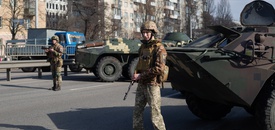HR may feel powerless, but there are steps companies can take to help, said Oyster CEO Tony Jamous.
For Oyster CEO Tony Jamous, the emergency unfurling in Ukraine is private. He spent the main ten years of his life in Lebanon, where he learned “firsthand how pulverizing [war] can be for individuals,” he told HR Dive in a call from Cyprus, where he migrated last August after years in Silicon Valley and London. “I feel extremely associated with the kids in Ukraine right now inwardly,” he said.
Clam, a worldwide work stage that oversees HR for organizations with worldwide representatives, serves somewhere in the range of 450 and 500 representatives across the globe – with “10s” of them in Ukraine. “Whenever this emergency broke, we needed to assemble an emergency group that hopped on the test and set up an activity plan,” Jamous said.
As the stage attempts to answer representatives’ necessities, Jamous required a couple of moments to let HR Dive know what laborers on the ground are requesting and the way in which distant bosses can help.
Impart that wellbeing is No. 1
More than anything, laborers need to realize the organization focuses on their security regardless of anything else. “It’s not OK to cause individuals to feel like their life doesn’t make any difference,” Jamous said. “This is truly significant in light of the fact that it makes deep rooted PTSD and long haul intense subject matters.”
Check in with representatives in the contention zone and let them in on the organization knows about the circumstance, is observing it and that their necessities are being focused on. Advise them that their own wellbeing is of most extreme significance and that work falls a lot further down the rundown. Comprehend that war is an injury and workers will be in an assortment of life changing circumstances.
“It is an opportunity to be more human-driven,” Jamous said. Check in consistently and keep awake to date on laborers’ situations with needs. Remember that crises and innovative issues might bring about holes in correspondence on laborers’ end.
Give movement help
In the wake of guaranteeing representatives’ wellbeing, HR should mind workers’ migration needs. Numerous Ukrainians are escaping the disaster area, especially ladies and youngsters. (Men between the ages of 18 and 60 have been arranged to remain in the country.)
Migration backing can incorporate visa sponsorship, helping with the movement cycle, giving brief or long-lasting lodging convenience, assisting exiles with enlisting for neighborhood medical care administrations and assisting them with opening a nearby ledger. Businesses could work with Airbnb, for instance, which is without offering, transient lodging for up to 100,000 outcasts escaping Ukraine – a help it likewise gave in the past to displaced people from Syria, Venezuela and Afghanistan.
Visa, an organization with around 155 representatives in Ukraine, has “employed security firms and transport transports” to shepherd laborers out of perilous regions. Leaving has become more diligently, with Russia entering further into the nation and Ukrainian designated spots set up to guarantee male residents are not among those escaping. All things considered, as of March 11, the UN appraises that more than 2.5 million exiles have escaped the country.
Visa workers are chiefly arriving in Poland, Moldova, Hungary and Romania. Where laborers end up is a significant perspective in deciding their future open doors and admittance to help, Jamous said.
“You’re going to [want to] contemplate consistence: When they land, do they reserve the option to work there? Do they need to apply for a work grant?” Jamous said, noticing there are various nations that offer laborers the option to work with no particular methods. Shellfish is working with legislatures to speed up movement processes, he said.
Guarantee cash is “not an issue”
HR ought to give its very best for guarantee installments are not hindered and workers can get to their cash. Propelling checks can give representatives some additional help. “As [people] escape from a disaster area, [they’re] going to have extra costs,” Jamous said. “You don’t need them to stress over cash simultaneously. Stress over saving their life.”
Bank capacities are probably going to be inconsistent, convoluting matters. About seven days before Russia’s intrusion of Ukraine, different government and banking administrations were hit with a cyberattack, bringing about specialists being briefly unfit to get to ledgers. While cyberattacks have been restricted up to this point, more goes after are reasonable later on.
Notwithstanding disturbance from cyberattacks, “Installment suppliers might close down nearby cash installment to Ukraine and Russia,” Jamous brought up. (Goldman Sachs as of late declared it was pulling out of Russia.)
Shellfish’s emergency group is “attempting to give elective installment strategies and installment choices that can run installments locally” to workers in Ukraine and Russia, Jamous said. “It’s not satisfactory the way that this will occur. Be that as it may, we need to figure out how to give the assets … particularly in Russia, as nations begin detaching from the worldwide SWIFT organization,” he said. “We’re simply preparing to fabricate this installment foundation that can convey this human basic assistance – compensations.”
In a blog entry Oyster composed on aiding laborers in Ukraine, the organization likewise referenced directing installment to a worldwide element other than Russia or Ukraine and paying representatives in U.S. dollars, euros or British pounds.
Give “liberal” downtime
It might appear glaringly evident given the conditions, yet laborers should be given as much downtime on a case by case basis to manage what is going on. “Ensure that work is certifiably not an extra explanation they have pressure at this moment,” Jamous said. Security, strategies, and admittance to medical care and different advantages should be generally focused on.
A few representatives, particularly once settled, might need to work. For those returning to work, adaptability is critical. This can incorporate “moving hours, redistributing undertakings, evolving needs, or all of the abovementioned,” Oyster noted in its blog entry. “We as individuals pioneers should stay agile by they way we’re dealing with your Ukranian labor forces and adjust as the circumstance and their necessities advance.”
Give admittance to psychological well-being assets
At last, recall what is going on unfurling in Ukraine is probably going to effectsly affect those encountering it. Giving admittance to guiding is one method for assisting representatives with dealing with their emotional well-being. Clam accomplices with Plumm Health, which associates laborers to specialists and furthermore offers online courses and contemplation.
Businesses ought to emphatically think about offering such a support of all representatives – not just those going through a worldwide emergency – as intensifying upsetting news and life occasions are negatively affecting specialists’ emotional well-being, Jamous noted.
While the current circumstance is asking HR directors with laborers in Ukraine to extend and perform errands that might not have been part of the expected set of responsibilities, “I think this is a chance for HR experts to truly grandstand for what reason they’re there and why their capacity is significant,” Jamous said.
“As associations progressively become worldwide and employ in a dispersed manner, there will be difficulties like this that will arise,” Jamous said. “Clearly, it’s really difficult. Yet, it’s [also] really fulfilling, due to the admittance to that variety, and the capacity to set out open doors for these individuals that they wouldn’t have had previously.”




